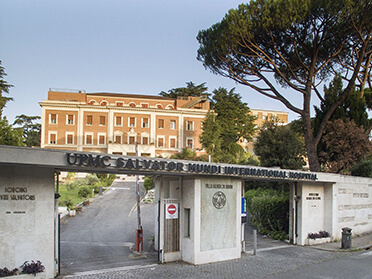Hernia Center at UPMC Salvator Mundi International Hospital
At UPMC Salvator Mundi International Hospital, we offer diagnosis and treatment of hernias, incisional hernias, and abdominal diastasis, using a multidisciplinary and personalized approach.
Our goal is to offer comprehensive care pathways, from clinical assessment to surgical treatment, also with minimally invasive techniques, minimizing symptoms and reducing the risk of recurrence.
Request a specialist consult: our team will recommend appropriate treatment for you and provide dedicated support throughout every phase of your care.
Conditions Treated
Our service offers diagnosis and treatment of major abdominal wall disorders, providing personalized care pathways tailored to the type of hernia, clinical complexity, and each patient’s individual needs.
Thanks to a multidisciplinary approach, patients receive a comprehensive evaluation and an accurate definition of the most appropriate treatment plan, which may include advanced minimally invasive surgical options.
Abdominal Wall Hernias
Abdominal wall hernias occur when internal organs or tissue push through a weakened area of the abdominal muscles. At UPMC Salvator Mundi International Hospital, we treat all major types of hernia through targeted programs tailored to case complexity and each patient’s clinical condition.
Types Treated:
- Inguinal hernia.
- Crural / femoral hernia.
- Umbilical hernia.
- Sports hernia.
- Rare hernias (e.g., Spigelian hernia, semilunar hernia).
Incisional Hernia (Postoperative Hernia)
Incisional hernias occur in scar tissue from previously made surgical incisions on the abdominal wall. They can develop months or even years after the surgery and require an accurate specialist evaluation to minimize the risk of recurrence and determine the most appropriate treatment strategy.
Abdominal Diastasis
Abdominal rectus diastasis is the separation of the abdominal muscles along the midline, typically occurring after pregnancy or significant weight changes.
Beyond its aesthetic impact, it can cause lumbar discomfort, postural disturbances, and diminished core stability. An accurate diagnosis is crucial to determine the most suitable rehabilitative or surgical approach.
Available Services and Care Pathways
We provide integrated and personalized care for abdominal wall conditions, including diagnosis, surgical treatment, and postoperative follow‑up.
Our goal is to provide a clear, comprehensive, and effective process tailored to each patient’s clinical needs.
Specialist Evaluation
- Specialist consult dedicated to abdominal wall disorders.
- Personalized clinical assessment and definition of the most appropriate diagnostic‑therapeutic plan.
Advanced Diagnostics
- Ultrasound of the abdominal wall.
- CT scan to study complex hernias and incisional hernias.
- MRI, when indicated for a detailed tissue assessment and precise surgical planning.
Surgical Treatment
- Minimally invasive laparoscopic surgery, suitable for a broad range of hernia types.
- Robotic surgery using the Da Vinci® system, selected in specific cases to enhance surgical precision, minimize tissue trauma, and support faster recovery.
- Traditional open surgery, recommended for large hernias, recurrences, or clinically complex conditions.
Rehabilitation and Multidisciplinary Support
- Pre‑ and postoperative physical therapy essential for functional recovery and particularly beneficial for athletes.
- Nutritional and endocrinology support provided to optimize treatment outcomes and overall recovery.

We offer medical services and services on a private basis or in agreement with the main insurance companies. Some of our services are also affiliated with the National Health System.
For more information on active agreements, visit:

